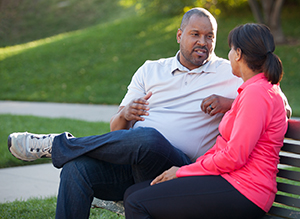Getting used to life with a chronic condition can be hard. You might find yourself feeling angry, sad, or even afraid. Rest assured, these feelings are normal. But too much stress or sadness can actually affect your blood sugar. Learn to watch for signs of these feelings. And know that you can get help.
Talking with your healthcare team
Learning to control blood sugar can sometimes be frustrating. You may have questions or fears about how diabetes may change your life. Your healthcare team is there to help you and answer questions. They can show you how to follow your meal plan, be more active, and check your blood sugar. Don’t be afraid to ask your healthcare team for help.
Asking others for help
You don’t have to deal with diabetes alone. Support from family, friends, or a diabetes support group can help you take better care of yourself. Ask others to:
-
Listen to your feelings. This will help you work through fear or anger.
-
Eat the same meals you eat from time to time. Your meal plan will be healthy for family and friends, too.
-
Exercise with you. Exercise is good for everyone. It strengthens the heart and helps relieve stress.
-
Go with you to visit your healthcare team. This will help your loved ones learn what you need to do.
Taking time to relax
Learning to relax and doing things you enjoy may reduce stress. Try yoga or meditation. Or listen to some music. Staying active and getting exercise also helps. Learn healthy ways to reward yourself when you have met one of your diabetes care goals.
Ways to relax
To relax your muscles and calm your mind:
-
Sit or lie back in a chair. Take a slow, deep breath. Hold it for 5 counts. Then breathe out slowly through your mouth. Keep doing this until you feel relaxed.
-
As you breathe deeply, tense and then relax the muscles in your body. Start with your feet and work up your body to your neck and face.
-
Picture yourself in a peaceful place, such as the beach. Feel the warm sand. Hear the waves. Smell the ocean. Doing this will help you feel more relaxed.
Activities that can help
Focus your mind on things you like. This may include:
-
Enjoying a hobby
-
Meditating or praying
-
Taking a walk with a friend
-
Exercising
-
Taking care of pets
-
Keeping a journal
-
Joining a social club or group
-
Volunteering with a community organization
-
Learning yoga or tai chi
-
Spending time with people you care about
Recognize depression
Many people feel sad or down when they first hear that they have diabetes. But feeling helpless or hopeless is a symptom of depression. Depression is a serious problem, but it can be treated. If you are having trouble sleeping or eating, or if you feel overwhelmed, contact your healthcare provider. Don’t wait! Get the support you need to feel good about managing diabetes.
Featured in


